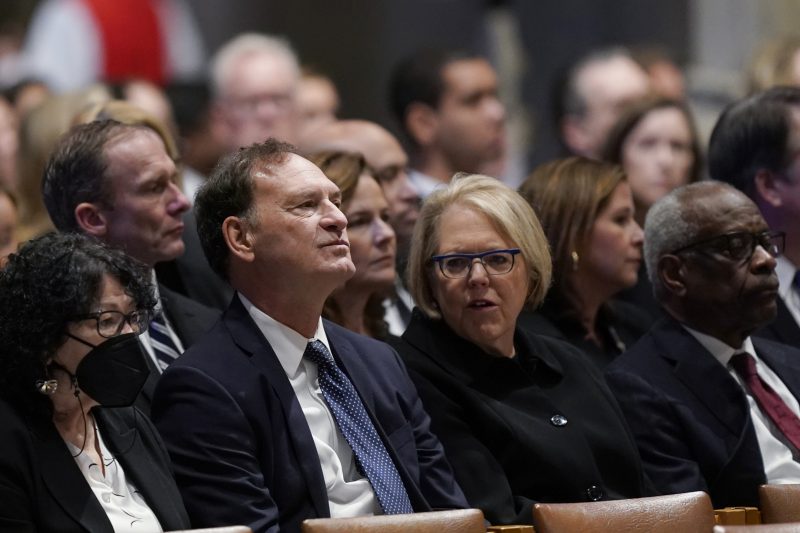Liberals have been united in their anger against Supreme Court Justice Samuel A. Alito Jr. following revelations that they say raise questions about the jurist’s ability to rule impartially on a pair of high-profile Jan. 6-related cases.
But what to do about the controversies is another matter.
The headline-grabbing accounts of politically charged flags at Alito’s homes and a secret recording of him suggesting there can be no compromise between liberals and conservatives have aggravated divisions in the Democratic Party at a pivotal moment.
Progressives and some liberal activists, incensed over what they see as an out-of-control court running roughshod over basic rules and riven by conflicts of interest, want Democratic leaders to move forcefully to address the issues.
But Democratic leaders, particularly Senate Judiciary Chairman Dick Durbin (Ill.), have taken a lower octane approach cognizant of political realities — the judiciary is an equal branch of government and congressional Democrats have limited opportunities to enact concrete changes.
The dynamic was crystallized after the recent revelations that Alito’s wife, Martha-Ann Alito, flew an upside-down American flag, a symbol adopted by some Jan. 6, 2021 rioters, at their Virginia home in the weeks after the Capitol attack, and another flag adopted by Christian nationalists at their New Jersey vacation home.
Durbin quickly said there was not “much to be gained” by holding an inquiry of the incidents, while more recently demands for a full probe of Alito came from Reps. Hank Johnson (D-Ga.) and Pramila Jayapal (D-Wash.), chair of the Congressional Progressive Caucus; and a group of prominent liberal groups, such as MoveOn.
The frustration of progressives has mounted as Alito has turned aside liberal calls to recuse himself from the Jan. 6 cases this term dealing with Donald Trump’s immunity and a charge used to prosecute Capitol rioters; and as Chief Justice John G. Roberts Jr. has rebuffed requests to appear before Congress to discuss ethics.
Republicans, who control the House, have opposed legislation to tighten ethical guidelines for the justices and have portrayed overhaul as a political effort to damage the legitimacy of a conservative Supreme Court that has delivered them major victories on abortion and other key issues.
The Alito controversies have capped a period of ongoing scrutiny of the court over stories about justices taking lavish, unreported gifts from wealthy benefactors and questions about whether Justice Clarence Thomas should recuse himself from election-related cases because his wife, Virginia Thomas, pushed to overturn the results of the 2020 election.
Alex Aronson, executive director of the oversight group Court Accountability, said in a statement that Durbin has taken a less confrontational approach on the ethics controversies because he has wanted to speed through the appointment of liberal judges to lower courts, so he has tried not to ruffle the feathers of Republicans who could hold up that process.
Aronson applauded Durbin for confirming over 200 of President Biden’s nominees to the federal bench and for taking actions in recent days, but said Durbin could still do more. A group of six Republican senators announced Thursday that they would no longer fast-track any Biden judicial nominees in response to the criminal prosecutions of Trump.
“The importance of confirming judges is no excuse for his failure to exercise his committee’s oversight authority to investigate the most serious ethics and corruption scandals in Supreme Court history, especially when the few judges Durbin hopes to confirm before November would inevitably see their rulings shredded by the Court’s captured right-wing supermajority in service to its billionaire backers,” Aronson said.
Durbin’s staff said he wasn’t available for comment. He has previously defended his record on Supreme Court ethics by pointing to multiple hearings his committee has held on the court, subpoenas issued and letters prodding the court to act on ethics issues.
Durbin appeared to make a nod to the bubbling concerns of his left flank Wednesday by attempting to expedite passage of the Supreme Court Ethics, Recusal, and Transparency (SCERT) Act. The bill would require the court to adopt a binding code of ethics and establish a mechanism to investigate alleged violations among other changes.
The Supreme Court adopted a new ethics code in November, but Democrats complain it is toothless because it does not have an enforcement mechanism.
“Our faith in the character and impartiality of our judges is essential to the functioning of our legal system and our constitutional form of government,” Durbin said on the Senate floor Wednesday. “But that faith requires judges, especially Supreme Court justices, to conduct themselves in a way that inspires public confidence.”
A unanimous consent vote, a largely symbolic effort since it only required a single Republican to block the measure, was scuttled by Sen. Lindsey Graham (R-S.C.), who also sits on the Judiciary Committee. Graham said the bill threatened the independence of the judiciary.
“Let’s be clear, this is not about improving the court, this is about undermining the court,” Graham said. “This would be an unconstitutional overreach.”
Durbin also announced action on another oversight issue, which pleased progressive activists including Aronson. The Judiciary Committee had issued subpoenas for Texas billionaire Harlan Crow and conservative activist Leonard Leo in November related to their interactions with the justices, but had not enforced them. The committee reached a deal with Crow on Thursday in which he disclosed he paid for an additional three trips on a private jet by Thomas.
The move came one day after Democrats on the House Oversight and Accountability Committee held a hearing, hoping to build momentum for action on Supreme Court ethics.
Reps. Jamie Raskin (D-Md.) and Alexandria Ocasio-Cortez (D-N.Y.) took turns blistering conservatives on the court Wednesday, citing their acceptance of unreported travel, tuition for relatives and other perks.
“The Supreme Court is currently facing a great crisis of legitimacy and it is a crisis of its own making,” Ocasio-Cortez said.
Raskin and Ocasio-Cortez announced they would introduce legislation limiting gifts to justices to $50, the same cap that applies to Congress.
Thomas revised his financial disclosures this month, saying he “inadvertently omitted” travel to Indonesia and California paid for by Crow. ProPublica, which first reported the trips, estimated the trip to Bali alone cost more than $500,000 and included a cruise on a 162-foot superyacht.
“The highest court in the land today has the lowest ethical standards,” Raskin said.
A previous version of the caption with this article’s photo misidentified the woman to the right of Justice Samuel A. Alito Jr. She is Virginia Thomas, not Martha-Ann Alito. The caption has been corrected.








